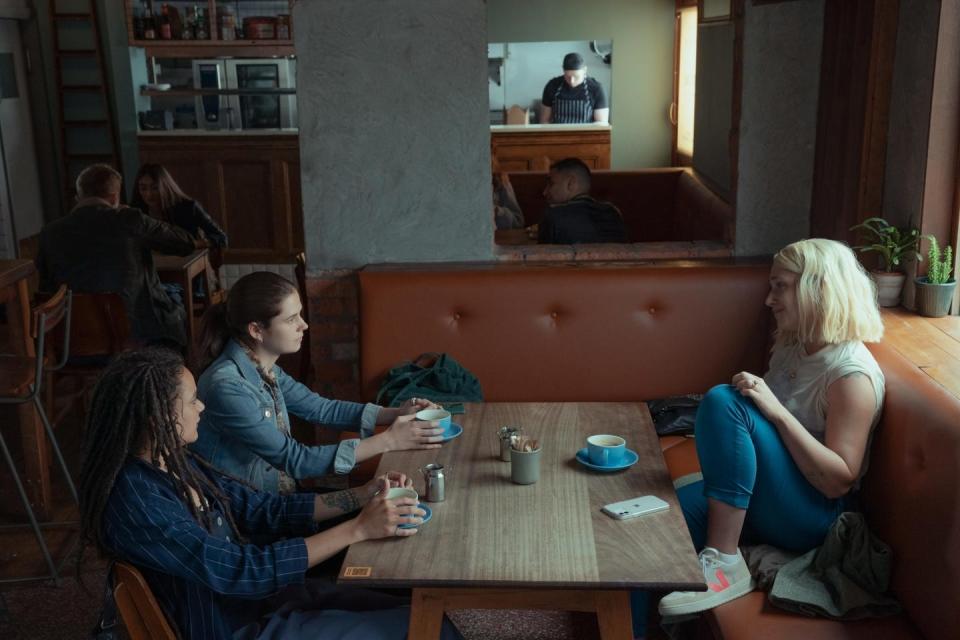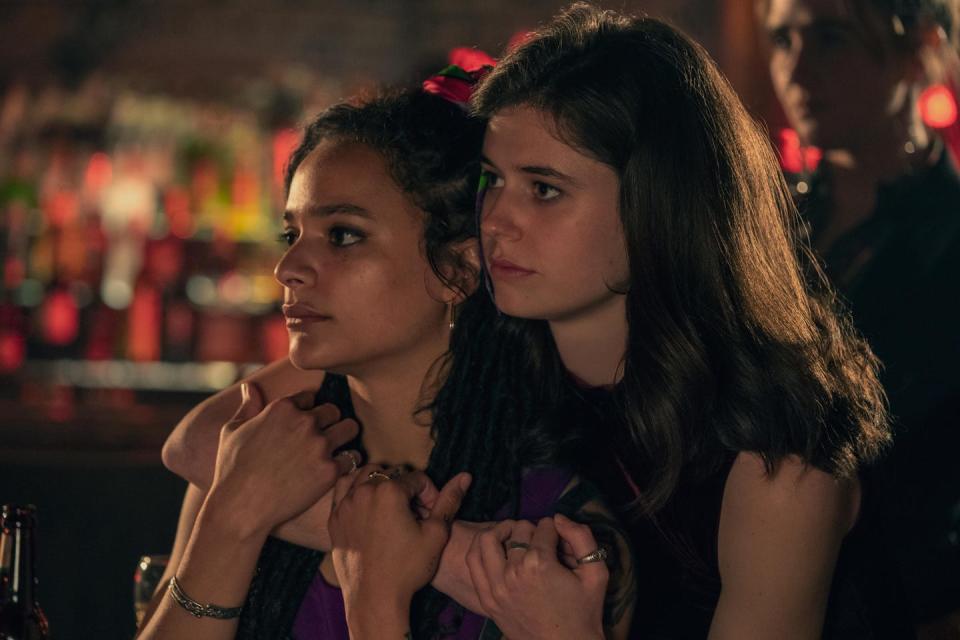How Does Hulu's 'Conversations with Friends' Compare to Sally Rooney’s Original Novel?
- Oops!Something went wrong.Please try again later.
Spoilers for Conversations with Friends, the book and the series, below.
If you follow any book-loving women between the ages of 18 and 33 on social media, you’ve probably seen some variation of this post: a link to the trailer for Hulu’s Conversations with Friends, captioned “This is my Joker.”
Translation: I have never in my lifetime anticipated anything as highly as this show. This TV adaptation represents a defining cultural moment for me. If your name isn’t Sally Rooney, don’t talk to me for the next six months. Inject this series directly into my veins.
Suffice it to say that Conversations with Friends—the 2017 book on which the new series is based—captured the imaginations of readers everywhere. A sort of literary touchstone for millennials (never mind the fact that the book’s protagonist is technically Gen Z), Irish author Sally Rooney’s debut novel overwhelmingly resonated with young women who have ever felt displaced, caught between chapters of their lives, overwhelmed by ill-advised love affairs, and alienated from their own bodies. The book follows Frances and Bobbi, two college-aged best friends and ex-girlfriends, as they become intertwined in the marriage of an older couple named Nick and Melissa. Bobbi has a crush on Melissa, but Frances is inexorably drawn to Nick—a fascination that quickly gives way to an all-consuming affair. Heartbreak and emotional chaos ensue.
When the series adaptation of Rooney’s second novel, Normal People, debuted on Hulu in 2020, Rooneymania blew up from literary phenomenon to full-blown cultural obsession—thanks in no small part to Lenny Abrahamson and Hettie Macdonald’s masterful direction, an elegant script by Rooney and Alice Birch, and star-making performances from Daisy Edgar-Jones and Paul Mescal as star-crossed lovers Marianne and Connell. So when the news broke that Abrahamson, Birch, and Normal People production company Element Pictures were re-teaming for a miniseries adaptation of Conversations with Friends, the internet just about lost its mind. And every new update—from casting announcements to trailer drops to the release of a new Phoebe Bridgers song written especially for the show—has only sent fans further into a frenzy.
So now that the long-awaited series is finally here, what is the verdict? Does Conversations with Friends live up to the lofty expectations set by both the book and the Normal People miniseries?
The answer: yes and no. To be completely fair, if one were to measure it by any non-Rooney-specific yardstick, the series would register as a resounding success. Stunning scenery, exquisitely captured on film; a pitch-perfect soundtrack; and a quartet of beautifully nuanced central performances—especially from Joe Alwyn as Nick—all contribute to making Conversations with Friends a quietly triumphant depiction of relationships young adulthood, at least when evaluated on the series’ own merits. But it doesn’t quite recreate the lightning-flash magic of the Normal People adaptation, and some key aspects of Rooney’s debut novel seem to have been lost in translation.
So, what are the key differences between Conversations with Friends the book and Conversations with Friends the series? Other than a few key surface-level changes—Bobbi, whom Rooney seemingly wrote as white, is played by Black and Maori actress Sasha Lane; a summer holiday in the French countryside gets relocated to Croatia—the show manages to pretty faithfully transpose most of the details from page to screen. Still, there are a few major changes that die-hard fans might want to be aware of before pressing play.
Frances’ inner monologue is missing.

The most significant change is also, perhaps, the most inevitable. Rooney’s novel is written in first-person from Frances’ perspective, so we get up close and personal with her innermost thoughts—the good, the bad, and the ugly. Seeing as Frances (played here by Alison Oliver) is, by her own admission, not a very expressive person, this perspective is often the only window we have into how she’s actually feeling.
Any screen adaptation of a book written in the first person faces an uphill battle when it comes to fully reflecting the inner life of the story’s narrator. In Conversations with Friends, Abrahamson opted against taking the “easy route” of adding in voiceover narration, a stylistic flourish that might have disrupted the naturalistic feel of the story. As a consequence, however, it often feels like you’re watching Frances through a pane of glass, with little to no insight as to what Frances (who is, again, canonically mysterious and hard to read) thinks of the people around her. As a result, many of the most meaningful contrasts in the story—between Frances’ deep well of feeling for Nick and the cold way she often treats him; between her worshipful reverence for Bobbi and the way she often appears to take her for granted—are lost. The result is a sort of coldness, a dulling of the emotional heights of the original novel.
It's not a surprise, then, that some of the most expressive scenes in the series are the sex scenes. Choreographed by Ita O’Brien, the intimacy coordinator who also orchestrated the famously revelatory sex scenes in Normal People, these moments are some of the most tender and revealing—for all the characters involved, but particularly for Frances, who seems largely incapable of letting down her guard while fully clothed. It’s in these scenes that we most fully grasp the disorienting pull of her feelings for Nick and the familiar, lived-in depth of her love for Bobbi.
Melissa never writes a profile.
In the book, Bobbi and Frances’ relationship with Melissa and Nick really takes off after Melissa asks to interview them about their spoken-word poetry for a magazine profile. They attend a dinner at the couple’s home, where Melissa seems—at least to Frances—to significantly favor Bobbi, an observation that foreshadows the characters’ dynamic throughout the rest of the novel. When she eventually sees the photos Melissa took that night, Frances is surprised to find herself featured just as prominently in the images as Bobbi.

In the series, Melissa (played by Jemima Kirke) never profiles the pair but instead asks Frances if she can use an excerpt from one of her poems as an epigraph in a soon-to-be-published book of essays. It’s a seemingly minor change, but one with potentially significant consequences for the characters’ relationships, particularly in light of the previously described loss of Frances’ interiority. In the book, Frances looks up to and even envies everything about Melissa: her house, her husband, her career. At the same time, she is convinced—almost from the very beginning of their relationship—that Melissa doesn’t particularly care for her, that she sees Frances as an annoyance or inconvenience impeding her friendship with Bobbi. The delicately imbalanced dynamic introduced by Melissa’s decision to profile the girls helps to set that tone. This makes it easier for the reader to buy into Frances’ belief that Melissa actively dislikes her, which is crucial in contextualizing Frances’ own behavior towards Melissa.
By contrast, the show’s decision to have Melissa request to quote Frances—and just Frances, since she writes the poems without Bobbi’s help—suggests, if anything, that Melissa finds Frances particularly interesting and impressive. Paired with the absence of Frances’ internal monologue, which has the effect of obscuring Frances’ conflicted feelings about Melissa, this change establishes a much friendlier dynamic between the two characters—at least on Melissa’s part. As a result, Frances’ own behavior towards Melissa hits differently.
Bobbi doesn’t kiss Frances on holiday.

When Bobbi and Frances are on holiday with Nick and Melissa, a tense dinner with Valerie—who in the series is Melissa’s agent, rather than her mentor as described in the book—serves as a turning point in Frances’ emotional journey. When Frances loses her temper at Valerie and storms off, Bobbi follows her, attempting to calm her down. In the book, while they are alone, Bobbi leans in and kisses Frances, saying, “We shouldn’t, obviously. But you are very lovable when you’re self-righteous.” It’s a disarmingly sweet moment that is absent from the series.
Much like the omission of Melissa’s article, the absence of this kiss is another seemingly minor change that speaks to a larger shift in the character dynamics between the book and the series. In the book, Frances is often thinking of Bobbi: recalling their romantic relationship in high school, analyzing how Bobbi treats her and other people, fearing above all else the possibility that Bobbi will someday discard Frances from her life. In the show, Frances and Bobbi are still inseparable, but their prior relationship is hardly even mentioned for at least the first half of the series, and there are hardly any displays of affection between the two—nor any other mannerisms that might have hinted at the depth of the pair’s codependence. The absence of the holiday kiss only further obscures the murky boundaries of Bobbi and Frances’ relationship.
In a seemingly unrelated change that contributes to this same overall effect, Bobbi and Frances’ friendship break-up also plays out a little bit differently in the series than it does in the book. On the page, Bobbi tells Frances that the piece of fiction Frances secretly wrote about her is “actually a good story” before tearing it up in front of her and storming out. Frances is bereft and waits for weeks—to no avail—to hear from her, with Rooney deftly describing that feeling of quiet despair: “Gradually the waiting began to feel less like waiting and more like this was simply what life was: the distracting tasks undertaken while the thing you are waiting for continues not to happen. I applied for jobs and turned up for seminars. Things went on.” Later, when Frances and Bobbi reunite, Bobbi admits that she isn’t even mad that Frances wrote and submitted the story—just that she didn’t tell her.
In the show, Bobbi never says either of those things to Frances—not that the story is good, and not that Frances’ keeping it a secret was more hurtful than the existence of the story itself. One thing she does say, as they’re breaking up, is that she doesn’t want to know Frances anymore—a line not present in the book that ought to have sent Frances reeling. However, Frances appears to cope no worse than in the book; if anything, the absence of Frances’ inner thoughts makes it seem that she’s handling their fight with comparatively little distress.

Frances’ self-harm is downplayed.
Perhaps the most overt change between the novel and the Hulu adaptation is how the television show chooses to depict Frances’ struggle with self-harm. Neither Abrahamson nor Birch have publicly addressed these changes or why they were made — it's possible they wanted to avoid leaving the impression that the show condoned self-harm — but the result has material consequences for Frances' characterization.
In the book, self-harm is a recurring issue for Frances; she feels the urge to hurt herself after seeing her dad early in the book, after learning at the hospital that she isn’t pregnant, and after visiting her father’s empty house to find it in rancid disarray. She repeatedly asks Nick to hit her during sex, and after both her relationships with both Bobbi and Nick abruptly end, she badly cuts herself on purpose. It also seems evident that the reader is meant to take some of her more reckless behavior—such as sleeping with the guy she meets on Tinder—as further self-harm.
The series omits pretty much all occurrences of physical self-injury, and incidents like Frances’ Tinder hook-up are painted less as self-punishment than as garden-variety poor decision-making. The one instance of self-harm that makes it to the series is Frances’ decision to cut herself after Bobbi and then Nick break up with her—but even this is portrayed as a pivotal moment in which Frances realizes she may have gone too far. (The book hints at no such revelation.) Later, when she confesses to hurting herself, she says it was a one-time thing and that she’s not going to do it again.
Maybe the Frances of the TV show means it, but the book version of Frances would never have said such a thing. For all her faults, after all, she does her best not to make promises she can’t keep.
You Might Also Like

